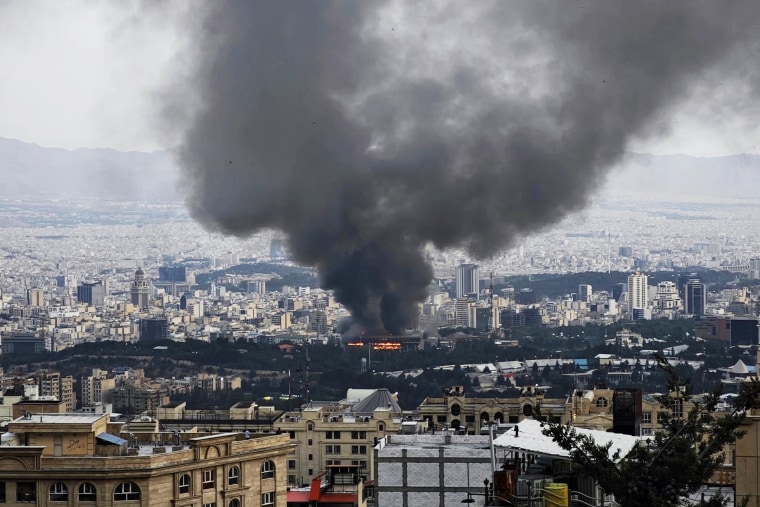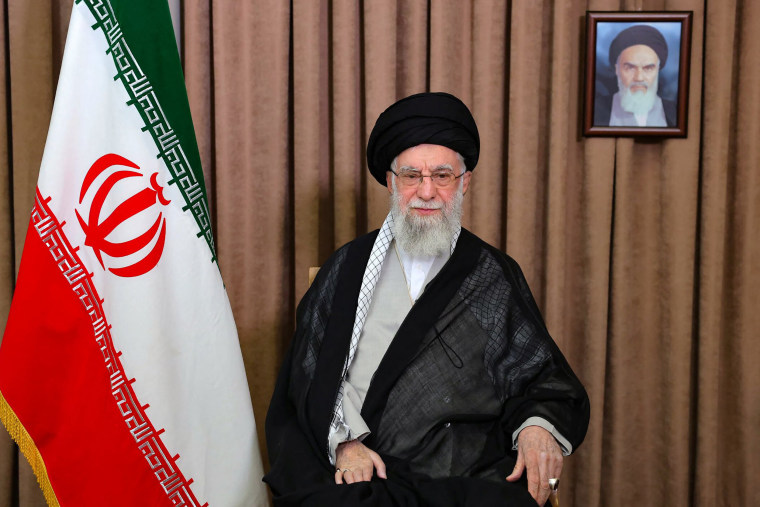Israeli Prime Minister Benjamin Netanyahu has suggested that targeting Iran’s supreme leader, Ayatollah Ali Khamenei, and overthrowing his government could be a way to end the war that erupted when Israel launched airstrikes at the Islamic Republic last week.
“We are doing what we need to do,” Netanyahu told ABC News on Monday night when asked if he plans to target Khamenei. “It’s not going to escalate the conflict, it’s going to end the conflict.”
Earlier over the weekend, Netanyahu suggested that Israel’s operation “could certainly” result in a change in leadership inside Iran.
His latest comments came as President Donald Trump indicated that the five-day conflict between the two countries could be entering a new phase as he left the G7 meeting of rich nations in Alberta, Canada, early to head back to Washington for meetings with top military officials.

But in a post on Truth Social, Trump said his departure had “nothing to do with” a ceasefire between Israel and Iran, refuting earlier comments made by France's President Emmanuel Macron that Trump had made a ceasefire offer and accusing his French counterpart of “publicity seeking.”
He added that his return to Washington was “much bigger than that,” but did not include any details.
In later comments to reporters on Air Force One, Trump again rejected the prospect of peace talks with Iran, saying that rather than a ceasefire, he preferred a “real end” to the stalled negotiations over a nuclear deal with the Islamic Republic.
He added that he would consider dispatching Vice President JD Vance and Special Envoy Steve Witkoff to meet with Iranian officials.
There were heavy airstrikes and explosions in the capital, Tehran, overnight, with Israel saying it had killed Ali Shadmani, Iran’s new wartime chief of staff and the country’s most senior military commander. Iranian officials did not confirm his death.
Israel's offensive has wiped out much of Iran's top brass, as well as senior scientists working on the country's nuclear program, which Israel says poses an "existential threat."
Iran says it is not seeking nuclear weapons, although the United Nations' nuclear watchdog, the International Atomic Energy Agency, last week condemned the Islamic Republic of breaching its nonproliferation obligations for the first time in almost 20 years.

Iran launched two waves of missiles in response to the Israeli attacks, setting off air raid alerts in parts of central and northern Israel in the early hours.
Netanyahu also dismissed reports that he and Trump were in disagreement over Israel's targeting of Khamenei, saying, “I wouldn’t rush to conclusions.”
The Israeli leader suggested that U.S. support for Israel’s attempts to eliminate Iran’s nuclear program would prevent the two allies from being “on the brink of nuclear war” waged by Iran, whom he accused of "stringing the U.S. along" during negotiations over a nuclear deal.
At least 224 people have been killed since Israel began bombing Iran on Friday, Iranian state media reported, while Iranian retaliatory strikes have killed at least 24 people in Israel.
While calls for a regime change in Iran have grown louder from Israel and its allies in Washington, Mohammad Eslami, a research fellow at Tehran University, told NBC News on Tuesday that inside Iran, the overwhelming sentiment was now focused on unity and holding the country together.
“This is a clear rally around the flag moment” for the Iranian people, Eslami said, adding, “The most important thing Iranians are thinking about the motherland.”
That sentiment did not necessarily channel into support for Khamenei, according to Jonathan Teubner, the founder of FilterLabs, a Massachusetts-based data company that uses AI and country-specific experts to gauge sentiment.
Analysis of publicly available information in Iran found that while Israel’s attack had appeared to unify people behind the government, the same could not be said for Khamenei. “The unity of Iran might be there, but it’s not rallying around the leader,” Teubner said.
Adding the caveat that Israeli information actors in Iran may have influenced the public sphere, Teubner said his data suggested “a lot more negativity towards the leadership for not being able to protect its people.”
In recent years, Iranians have regularly taken to the streets to oppose the regime’s crackdown on freedom of speech and personal freedoms.
After Mahsa Amini, a 22-year-old Kurdish woman, died following her detention by Iran's morality police for not wearing her hijab properly, there was a wave of mass unrest as thousands of people took to the streets of cities across the country to protest.
The effects can still be felt in Iran, where many women now choose to walk the streets without headscarves, defying the state.
The regime's standard hard power tactics had become degraded in recent years, Teubner said. “That does not lead to a good condition for being able to wage a long-term war,” he added.
